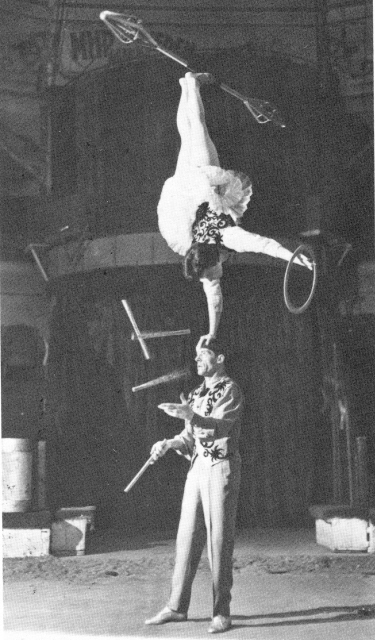
Ignatov's teacher, Violetta Kiss, balanced atop her husband, Alexander. 1959. |
Page 22 Winter 1990 - 91
|
The
students gathered - the assessors were choosing. Some they selected
for their fine appearance, others for their excellent marks; still
others for stubbornness and character. Some were chosen through a
temperament, suitable to the theme of a planned routine. But it also
happened that after two years of excellent marks and many fine
impressions, some turned out to be dull and mediocre.
The
assessors - do they have the right to be fair, good or bad?
No! An assessor could either be or not be at all. One might
compare him with a surgeon at an operating table. The responsibility
is no less. We're not afraid of mistakes, although it simply hurts
when an assessor hurts someone with excellent abilities. For that
reason I always admired those who worked with Yuri Gavrilovich
Mandich, Sergei Andreievich Kashtenyan and Viktor Lvovich Pliner.
These instructors could find the most important characteristics
inherent in every student. They were able, day by day, almost
imperceptibly, to develop those abilities. They were able to find
the necessary expressive essence, so that in developing it, it
transformed itself into the strength and form of the new individual
performer, and afterwards, perhaps, into the sphere of the genre
itself.
Not
rushing time was a guarantee of their success. They never had a
completely fixed system of instruction. They created one in the
process of working with their students. And terrible were those
instructors who "shoved" their wards through a previously
prepared educational scheme. The viewing public huddles and fidgets
when seeing such performers precisely because this proper training
has been so untactfully bypassed.
The
entire second year, while I rehearsed with the juggling group, I was
watched over by the recently arrived (to the school) instructor,
Violetta Nikolaevna Kiss.
In the past Violetta Kiss and her brother, Alexander, had created, as a part of a unique act, a joint presentation of juggling and equilibristics. In Violetta Kiss, in my view, were united all the indispensable qualities of a teacher/instructor. After two short years of work she was able to give me an exceptionally firm foundation in juggling, which for almost 20 subsequent years have been the fundamentals of my creative work.
The
skill of a teacher or a instructor is impossible to teach. You have
to form it from within. It is apparent that in the mind of a person
there exist millions of combinations and connections which come
together to form all instructor. Part of this is a feeling of the
correct time, life experiences, intellect, education and a unique
world view and much, much more. I've never seen books which could
tell one how to become an instructor. Usually authors analyze the
process by which they became teachers or instructors, sparingly
giving prognoses for the future.
An
instructor is the living past and lives the future. Without tricks
and variations there is no such thing as a juggler, but for Violetta
Nikolaevna Kiss the most important thing was the person. We first of all leamed from her the importance of honesty; everywhere, always and towards all. I rehearsed with her for some three hours a day and without her for five or six. Nothing was left out. In front of us were two frontiers-a minimum of time (two years) and a maximum of work. I passed through the school of Violetta Kiss.
|

Ignatov's teacher, Violetta Kiss, balanced atop her husband, Alexander. 1959. |